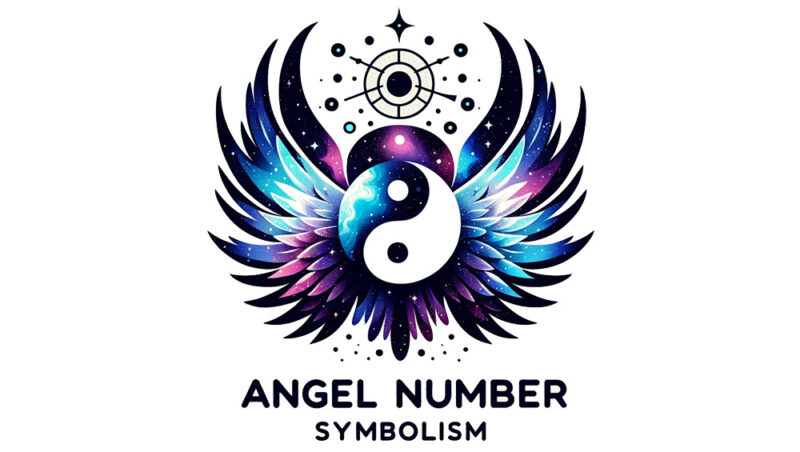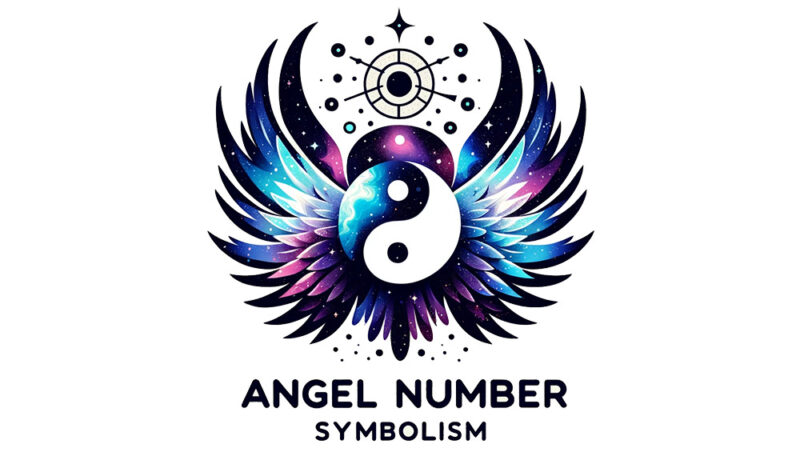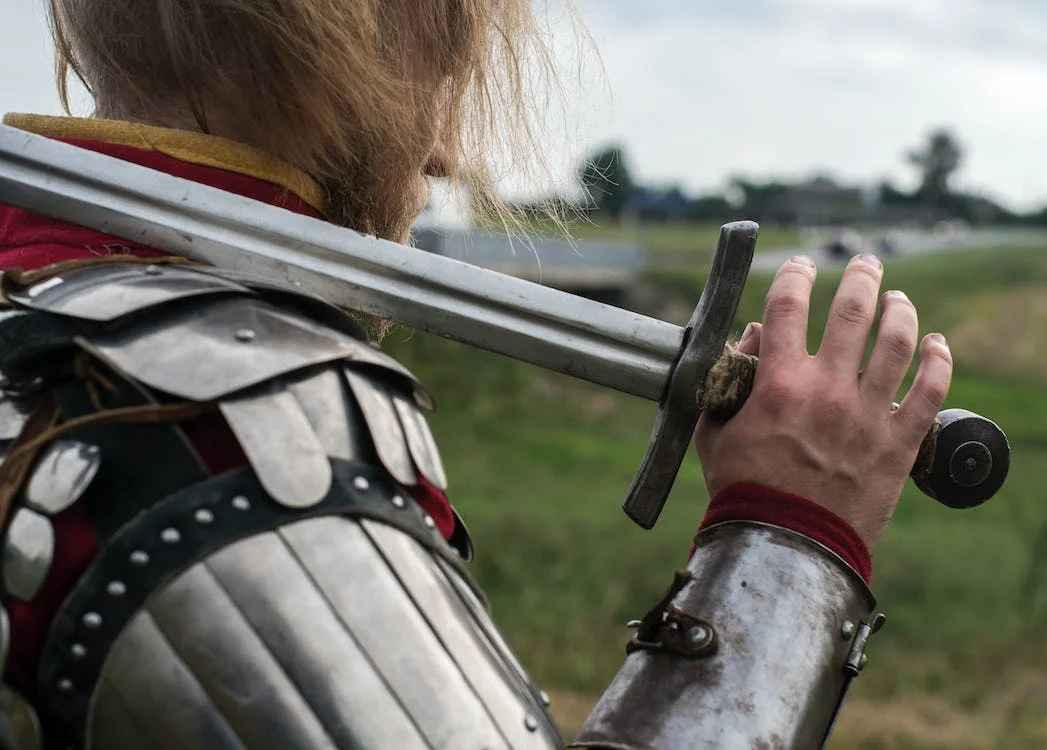Swords, with their gleaming blades and powerful design, have long captured our imagination. But beyond their physical prowess, swords hold deep spiritual symbolism. In the realm of spirituality, a sword represents more than just a weapon – it is a tool for unleashing divine power.
In medieval times, knights pledged their swords as a symbol of their word, honor, and loyalty. This association between swords and spirituality is not surprising, considering the code of honor and chivalry they upheld. But the significance of a sword in spirituality goes beyond the knightly tradition.
Throughout history, swords have been linked to divine authority, transformation, and the quest for truth. They have been revered as sacred objects, used in spiritual rituals and ceremonies, and depicted in myths and legends. In various spiritual traditions, swords are seen as symbols of protection, enlightenment, and the cutting through of ego and illusion.
Key Takeaways:
- The spiritual meaning of a sword is rooted in its symbolism of divine power and transformation.
- Swords have been used as symbols of honor, loyalty, and the quest for truth.
- Swords represent protection, the cutting through of illusions, and connection with higher realms.
- They hold a sacred place in spirituality and are used in rituals and ceremonies.
- Swords also hold artistic and decorative significance, representing personal strength and connection with warrior archetypes.
The Symbolic Meaning of a Knight’s Sword in Medieval Times
In medieval times, a knight’s sword held deep symbolic meaning, representing their word, honor, and life. When a knight pledged his sword, it was a powerful gesture symbolizing his unwavering commitment to protect and serve his king, country, and God.
The sword was not just a physical weapon but a reflection of the knight’s character and ideals. It embodied their courage, chivalry, and willingness to sacrifice for a noble cause. It was a symbol of their unwavering dedication to their duty as defenders of the realm.
Moreover, the sword carried a spiritual significance for knights. They believed that their swords were infused with divine power, granting them strength and protection in battle. It was an emblem of righteousness and a reminder to uphold the values of faith, justice, and loyalty.
However, it is worth noting that the association of praying in front of swords as religious symbols is more of a romanticized Hollywood concept than a historically documented practice. While swords held spiritual and symbolic meaning to knights, the act of praying specifically in front of swords may not have been a widespread tradition.
Overall, the symbolic meaning of a knight’s sword in medieval times encompassed notions of honor, duty, valor, and a deep connection to divine power. It represented the knight’s unwavering commitment to their cause, and the embodiment of the virtues they pledged to uphold.
The Rosary Sword: A Heavenly Weapon of Transformation
The rosary sword is a spiritual weapon described as a heavenly sword forged by divine inspiration. It is believed to have the power to slay demons, convert sinners, and conquer hearts. The sword was revealed to a zealous preacher, St. Dominic, who founded the Order of Preachers to champion the rosary. Throughout history, the rosary sword has been associated with miraculous victories and the preservation of nations.
| Symbol of the Rosary Sword | Spiritual Significance |
|---|---|
| Slaying demons | Defeating and dispelling negative energies |
| Converting sinners | Bringing about spiritual transformation and redemption |
| Conquering hearts | Inspiring love, faith, and devotion |
| Miraculous victories | Achieving unexpected and divine-assisted triumphs |
| Preservation of nations | Ensuring the well-being and spiritual protection of communities |
“The rosary sword, with its transformative power, serves as a testament to the strength and grace bestowed upon us by the divine. It is a spiritual instrument that empowers us to overcome the forces of darkness, embrace righteousness, and foster spiritual growth.” – St. Dominic
The Sword of Laban: A Symbol of Divine Authority and Kingship
The Sword of Laban is an ancient artifact mentioned in the Book of Mormon, and it holds great significance as a symbol of divine authority and kingship. According to the scriptures, Laban was a powerful and influential figure in ancient Jerusalem who possessed this sacred weapon.
In the narrative, Laban’s sword played a pivotal role when it was obtained by Nephi, a righteous prophet and leader. Nephi was commanded by God to retrieve the sword as part of a divine mission. The sword ultimately became a crucial symbol of authority, not only within Nephite history but also in the restoration of the Church.
“And it came to pass that the Spirit said unto me again: Slay him, for the Lord hath delivered him into thy hands; Behold the Lord slayeth the wicked to bring forth his righteous purposes. It is better that one man should perish than that a nation should dwindle and perish in unbelief.”Moses 4:23 (Book of Mormon)
The acquisition of the Sword of Laban marked a turning point in Nephi’s journey and established his divine authority. It became an essential element of Nephite culture and was considered part of the royal regalia. The sword symbolized the rightful power and leadership of Nephite kings, serving as a reminder of their duty to govern in righteousness.
Furthermore, the Sword of Laban represents the restoration of the Church in the latter days. It signifies a time when divine authority was brought back to the earth, allowing individuals to access the blessings and ordinances of the restored gospel.
Through its rich symbolism and historical significance, the Sword of Laban exemplifies the divine authority and kingship that is central to the spiritual narrative of the Book of Mormon. It serves as a reminder of the importance of upholding righteous principles and seeking God’s guidance in our lives.
Swords as Symbols of Power and Nobility
Swords have long been revered for their association with power and nobility. These elegant weapons embody strength and authority, representing the ability to protect, conquer, and uphold justice. Throughout history, swords have played a significant role in the lives of rulers and nobles, serving as symbols of their social status and influence.
“The power of a sword lies not only in its physical form, but also in the prestige it commands. Holding a sword signifies one’s position of authority and the responsibilities that come with it.”
From ancient civilizations to medieval times, wielding a sword was a privilege granted to those of noble birth. The possession of a sword elevated an individual’s stature, setting them apart from the common populace. It served as a visual representation of their elevated position and signified their place in the ruling class.
Furthermore, the nobility of a sword extends beyond its physical attributes. It embodies the ideals of honor, chivalry, and courage. Knights, who were considered the epitome of nobility, adhered to a strict code of conduct known as chivalry. The sword became a symbol of their commitment to these virtues, an affirmation of their dedication to serving and protecting others.
Swords were not only tools of war but also objects of artistry and craftsmanship. The intricate designs and embellishments adorning the hilt and blade showcased the wealth and taste of the sword’s owner. These ornate details further emphasized the association between swords and nobility, highlighting the owner’s refined sensibilities and refined status.
In recognition of the power and nobility of swords, they were often bestowed with names and given special significance. Historical swords such as Excalibur and Joyeuse became legendary symbols of kingship and heroism. These revered weapons captured the collective imagination and continue to inspire awe and fascination to this day.
The Power and Nobility of Swords in History
To gain a deeper understanding of the power and nobility associated with swords, let us explore some notable examples from history:
| Sword | Owner | Significance |
|---|---|---|
| Excalibur | King Arthur | Symbol of divine right to rule |
| Joyeuse | Charlemagne | Symbol of Charlemagne’s authority and justice |
| Tizona | El Cid | Symbol of El Cid’s legendary courage and valor |
| Kusanagi-no-Tsurugi | Japanese Emperors | Symbol of imperial power and legitimacy |
These swords exemplify the power and nobility that swords represented in different cultures and time periods. They symbolize leadership, heroism, and the divine right to rule.
In conclusion, the power and nobility of swords extend well beyond their physical attributes. These weapons hold a place of reverence and respect in the realms of history, mythology, and culture. They serve as symbols of authority, honor, and the ability to protect and uphold justice. The elegance and destructive potential of swords have captivated human imagination for centuries, leaving an indelible mark on the collective consciousness.
The Mystical Meaning of a Sword in Spiritual Practices
In various spiritual traditions, swords hold a mystical meaning. They are often seen as symbols of spiritual protection, transformation, and enlightenment. Swords represent the cutting through of illusions and ego, paving the way for spiritual growth and self-realization. The sword is seen as a spiritual tool for piercing through darkness, dispelling negative energy, and connecting with higher realms.
Swords as Sacred Objects in Spiritual Rituals
In the realm of spirituality, swords hold a sacred place and are often utilized in various rituals and ceremonies. These ancient weapons are not merely symbolic, but are considered powerful instruments for invoking divine energy, channeling spiritual forces, and creating sacred space.
“The sacredness of swords in spirituality lies in their ability to connect us with the presence of the divine,” says Dr. Catherine Johnson, a spiritual researcher. “When we hold a sword during a ritual, we tap into its spiritual symbolism and invite the divine presence to guide and protect us.”
Instruments of Invocation
Throughout history, swords have been utilized as tools of invocation, empowering individuals to connect with higher realms and spiritual energies. The act of wielding a sword during a ritual signifies a sacred agreement between the practitioner and the divine. It symbolizes the calling forth of divine power and the opening of a channel for spiritual communication and guidance.
“When we hold a sword during a ritual, we are consciously and energetically aligning ourselves with the spiritual forces we seek to invoke,” explains Dr. Johnson. “The sword becomes an extension of our intention, amplifying the energetic vibrations and creating a bridge between the physical and spiritual realms.”
Guardians of Sacred Space
Within many spiritual traditions, swords are regarded as sacred objects that hold spiritual protection. They are often used to define and create sacred space, marking the boundaries between the mundane and the divine. In rituals and ceremonies, the sword acts as a guardian, warding off negative energies and ensuring the purity and sanctity of the sacred space.
| Symbolism | Meaning |
|---|---|
| Divine Presence | A sword symbolizes the presence of the divine. It serves as a tangible representation of the spiritual forces that guide and protect. |
| Protection | In spiritual rituals, a sword is believed to provide spiritual protection, safeguarding participants from negative energies and spiritual interferences. |
| Divine Power | Wielding a sword during a ritual signifies the empowerment and invocation of divine power, allowing practitioners to tap into spiritual energies. |
Furthermore, in some spiritual traditions, swords are consecrated and imbued with sacred energy through rituals, prayers, and blessings. These consecrated swords hold a deeper spiritual significance and are regarded as channels of divine energy.
“Just as a sacred object, the sword carries the blessings and wisdom of the divine,” says Master Tao Li, a spiritual teacher. “When we hold a consecrated sword, we tap into the accumulated spiritual energy and receive the support of the divine forces.”
Indeed, the sacredness of swords in spirituality encompasses both their physical and metaphysical qualities. They are not only objects of historical significance but carry a spiritual symbolism that resonates deeply with practitioners.
The Transformative Power of Sword Meditation
Sword meditation is a powerful practice that allows us to tap into the transformative power of a sword as a spiritual tool. By harnessing the symbolism and energy of a sword, we can cultivate focus, self-discipline, and spiritual insight.
During sword meditation, we visualize and embody the qualities of a sword, such as strength, clarity, and discipline. As we connect with the essence of the sword, we access our own inner power and manifest positive change in our lives.
Sword meditation is a deeply transformative practice that can help us in various aspects of our lives. It allows us to:
- Unleash Inner Strength: By embodying the strength of a sword, we tap into our own inner reservoirs of resilience and courage. This enables us to face challenges with confidence and overcome obstacles along our spiritual journey.
- Cultivate Clarity: The sword’s sharpness and precision serve as reminders to cultivate mental clarity and focus. Through sword meditation, we can quiet our minds, cut through distractions, and gain clarity of thought.
- Foster Self-Discipline: Just as a sword requires discipline to wield effectively, sword meditation helps us develop self-discipline in our thoughts, actions, and emotions. It enhances our ability to stay centered, grounded, and aligned with our spiritual path.
- Access Spiritual Insight: The symbolic nature of the sword opens doors to spiritual insight and understanding. By engaging in sword meditation, we create a space for divine wisdom to flow through us, guiding us on our spiritual journey.
Sword meditation is a personal practice that can be adapted to suit individual beliefs and preferences. Some practitioners may choose to visualize a specific type of sword, while others may focus on the qualities they associate with swords in general. The key is to engage with the transformative power of the sword and allow it to guide and empower us.
Sword meditation is not limited to those with physical swords. The transformative power lies within the mind and spirit, where the true connection to the sword’s energy resides.
Through regular practice, sword meditation can deepen our connection to the transformative power of a sword and unlock new dimensions of growth and spirituality. It is a potent tool for self-discovery, personal empowerment, and the realization of our highest potential.
Swords in Mythology and Legends
Swords hold significant symbolism in mythology and legends. They are often associated with heroic figures, representing courage, honor, and the quest for truth. In mythology, swords are depicted as tools of gods and goddesses, signifying their divine authority and power. They are mythic symbols of victory, justice, and the triumph of good over evil.
The Symbolic Significance of Swords in Tarot and Divination
In tarot and divination practices, swords hold a profound symbolic significance. They represent the realm of thoughts, intellect, and communication. Swords symbolize analytical thinking, mental clarity, and the power of words. They are associated with the element of air, representing logic, reason, and rationality.
“The sword is a powerful tool of discernment and insight. It cuts through the fog of illusion and confusion, revealing the truth that lies beneath.”
“Just as a skilled swordsman uses their blade to navigate through challenges, a tarot reader uses the symbolism of a sword to guide seekers in making logical decisions, finding clarity, and resolving conflicts.”
Swords in divination often serve as a reminder to approach situations with a logical mindset and apply critical thinking. They signify the need to cut through distractions and focus on the core issue at hand. When a sword card appears in a tarot reading, it may indicate conflicts, challenges, or the need for assertiveness and decisive action.
“The presence of a sword card invites the querent to be assertive, confident, and express themselves clearly. It encourages them to harness the power of their thoughts and communicate effectively.”
Here is an example of how the symbolism of swords is represented in a tarot deck:
| Card Name | Symbolic Meaning |
|---|---|
| The Ace of Swords | Clarity, new ideas, mental breakthroughs |
| The Three of Swords | Heartbreak, emotional pain, grief |
| The Seven of Swords | Deception, trickery, secrecy |
Through the symbolic imagery and interpretations of these cards, readers can gain insights into various aspects of their lives, ranging from personal relationships to career decisions.
“Swords in tarot and divination provide a roadmap to navigate the challenges of life by accessing the power of clear thinking and effective communication.”
Overall, the symbolism of swords in tarot and divination invites individuals to embrace their intellectual prowess, think critically, and communicate with precision. It harnesses the power of the mind and encourages seekers to cut through illusions and make informed decisions.
Swords as Artistic and Decorative Symbols
Swords have long been admired for their aesthetic beauty, elegance, and historical significance. They hold a unique place in various forms of visual arts, literature, and mythology, serving as powerful symbols of power, protection, and connection with warrior archetypes.
In the world of jewelry, swords are popular motifs that exude strength, courage, and resilience. They are often crafted into pendants, charms, or rings, becoming wearable reminders of personal fortitude and the ability to triumph over adversity. Whether adorned with precious gems or intricately engraved, these sword-inspired pieces add a touch of symbolism and sophistication to any ensemble.
The symbolic meaning of a sword intersects various artistic realms, from literature to visual arts, creating a tapestry of interpretations that captivate our imagination and stir our souls.”
Swords are also sought after in the world of tattoos, allowing individuals to permanently etch their personal stories or beliefs on their skin. Whether it be a solitary sword or a full-blown battle scene, these inked artworks serve as potent visual representations of one’s inner strength, honor, or spiritual journey. They demand attention and command respect, signifying the bearer’s unwavering commitment to their values and principles.
Furthermore, swords find their place in home decor, where they add a touch of historical allure and intrigue. Displayed proudly on walls or showcased in elegant stands, these decorative swords become conversation starters and centerpieces of inspiration. They evoke a sense of power and authority, reminding us of the legendary warriors and the spirit of chivalry that endures throughout history.
Sword Symbolism in Visual Arts
In the realm of visual arts, swords have been featured prominently in various mediums, including paintings, sculptures, and tapestries. Renowned artists throughout history have incorporated swords in their artworks as potent symbols imbued with spiritual meaning and allegorical depth.
One notable example is the famous painting “Excalibur” by the legendary artist John William Waterhouse. Depicting the mythical sword of King Arthur, the painting portrays the intertwining of beauty, power, and destiny. The sword represents the ability to unite a kingdom, fulfill prophecies, and uphold justice.
Another manifestation of sword symbolism can be found in the iconic statue of Joan of Arc in Place des Pyramides, Paris. Clutching her sword with unwavering determination, the statue immortalizes her courage, faith, and unwavering spirit. Joan of Arc’s sword encapsulates her commitment to defending her country and her unwavering devotion to her spiritual visions.
Aesthetic Beauty and Symbolic Depth
Through the ages, swords have captivated the minds and hearts of artists, poets, and dreamers. Their allure lies not only in their inherent beauty but also in the profound symbolism they carry. A sword is more than a mere weapon; it is a representation of strength, protection, and the embodiment of the warrior spirit.
Swords serve as artistic and decorative symbols that visually express our longing for inner fortitude, noble ideals, and the pursuit of truth. They fuel our imagination and invoke a sense of awe and wonder, reminding us that we too possess the power to unsheathe our own divine potential.
Conclusion
The spiritual meaning of a sword is rich and diverse, resonating deeply across various traditions and cultures. Swords symbolize not only power and nobility but also transformation and divine authority. These sacred objects play significant roles in rituals, meditation practices, and mythologies, serving as tools for protection, metaphors for spiritual growth, and representations of personal strength. The sword holds a profound place in the realm of spirituality, inviting individuals to explore its symbolism and unlock its transformative potential.
Throughout history, swords have been revered as powerful instruments that embody strength, honor, and the ability to protect and conquer. They are not only elegant weapons but also emblems of social status and influence. From the knights of medieval times to the sacred sword of Laban, the spiritual significance of swords is intricately woven into the fabric of human civilization.
In spiritual practices, swords take on a mystical meaning, representing spiritual protection, enlightenment, and the cutting through of illusions. They are regarded as tools for dispelling negative energy and connecting with higher realms. The use of swords in rituals and ceremonies further underscores their sacredness, inviting the presence of the divine and fostering spiritual transformation.
Whether encountered in mythology, tarot cards, or artistic depictions, the sword serves as a powerful symbol of courage, truth, and victory over evil. It represents the realm of intellect, communication, and logical decision-making. The sword’s aesthetic beauty and historical significance make it a popular motif in visual arts, literature, and personal adornment, evoking feelings of personal strength, protection, and a deep connection to warrior archetypes.
In conclusion, the spiritual meaning of a sword is multifaceted and profound, encompassing themes of power, transformation, divine authority, and personal strength. Across different cultures and spiritual practices, the sword stands as a powerful reminder of our quest for truth and our ability to overcome challenges. Embracing the symbolism of the sword allows us to tap into its transformative power, opening doors to spiritual growth and self-realization.
FAQ
What is the spiritual meaning of a sword?
The spiritual meaning of a sword encompasses symbolism of power, nobility, transformation, and divine authority. It is seen as a tool for unleashing divine power and is often used in spiritual practices and rituals.
What is the symbolic meaning of a knight’s sword in medieval times?
In medieval times, a knight’s sword represented their word, honor, and life. It symbolized their commitment to protect and serve their king, country, and God, although there is debate among historians and scholars about the religious significance of swords in knightly traditions.
What is the Rosary Sword?
The Rosary Sword is a spiritual weapon described as a heavenly sword forged by divine inspiration. It is believed to have the power to slay demons, convert sinners, and conquer hearts. It holds transformative power and is associated with miraculous victories and the preservation of nations.
What is the Sword of Laban?
The Sword of Laban, mentioned in the Book of Mormon, is seen as a symbol of divine authority and kingship. It played a significant role in Nephite history and was considered part of the royal regalia, signifying the authority of Nephite kings. It is also associated with the restoration of the Church in the latter days.
How are swords seen as symbols of power and nobility?
Throughout history, swords have been associated with power and nobility. They represent strength, authority, and the ability to protect, conquer, and uphold justice. Rulers and nobles have used swords as symbols of their social status and influence.
What is the mystical meaning of a sword in spiritual practices?
In various spiritual traditions, swords hold mystical meaning. They are symbols of spiritual protection, transformation, and enlightenment. Swords represent the cutting through of illusions and ego, paving the way for spiritual growth and self-realization. They are seen as tools for piercing through darkness, dispelling negative energy, and connecting with higher realms.
How are swords considered sacred objects in spiritual rituals?
Swords hold a sacred place in spirituality and are often used in rituals and ceremonies. They are considered powerful instruments for invoking divine energy, channeling spiritual forces, and creating sacred space. Swords symbolize the presence of the divine and are believed to hold spiritual protection. In some traditions, swords are consecrated and regarded as sacred objects.
What is sword meditation and its transformative power?
Sword meditation is a practice that harnesses the transformative power of a sword. By visualizing and embodying the qualities of a sword, such as strength, clarity, and discipline, practitioners can cultivate focus, self-discipline, and spiritual insight. Sword meditation is believed to tap into inner power and manifest positive change in one’s life.
How are swords portrayed in mythology and legends?
Swords are often associated with heroic figures in mythology and legends, representing courage, honor, and the quest for truth. They are depicted as tools of gods and goddesses, symbolizing divine authority and power. Swords are mythic symbols of victory, justice, and the triumph of good over evil.
What is the symbolic significance of swords in tarot and divination?
In tarot and divination practices, swords represent the realm of thoughts, intellect, and communication. They symbolize analytical thinking, mental clarity, and the power of words. Swords in divination often indicate the need for logical decision-making or the need to cut through illusion and confusion. They can also signify conflicts, challenges, and the need for assertiveness.
How are swords seen as artistic and decorative symbols?
Swords are often used as artistic and decorative symbols in various forms of visual arts, literature, and mythology. They can represent aesthetic beauty, elegance, or historical significance. Swords are popular motifs in jewelry, tattoos, and home decor, symbolizing personal strength, protection, and a connection with warrior archetypes.





